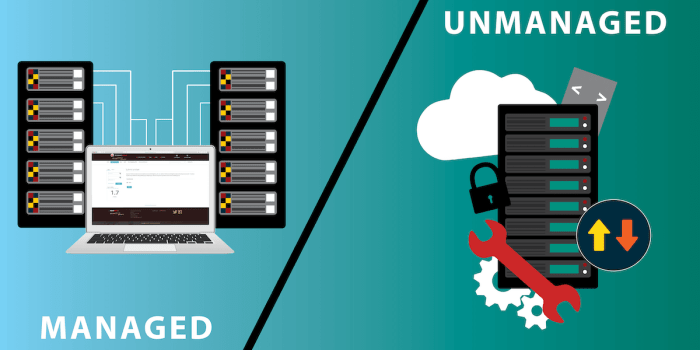Exploring the differences between managed and unmanaged server hosting, this article delves into the key aspects that businesses need to consider. From control levels to cost implications, we break down the essential information for you.
Managed vs. Unmanaged Server Hosting
When it comes to server hosting, there are two main options to consider: managed and unmanaged. Each type offers different levels of control and support, catering to varying needs and preferences.
Managed Server Hosting
Managed server hosting is a service where the hosting provider takes care of all the technical aspects of managing the server. This includes tasks such as software updates, security monitoring, backups, and technical support. Essentially, the hosting provider handles the day-to-day operation and maintenance of the server, allowing the client to focus on their business without worrying about server management.
Unmanaged Server Hosting
On the other hand, unmanaged server hosting puts the responsibility of server management entirely on the client. In this scenario, the hosting provider only provides the physical server and network connection. The client is responsible for installing and maintaining the operating system, software updates, security configurations, and overall server management.
This option is suitable for clients who have the technical expertise and resources to handle server administration independently.
Key Differences
- Level of Control:Managed hosting offers a higher level of control as the provider handles most of the server management tasks, while unmanaged hosting gives the client full control and responsibility over the server.
- Support:Managed hosting includes 24/7 technical support and assistance, whereas unmanaged hosting may have limited or no support, depending on the provider.
- Cost:Managed hosting tends to be more expensive due to the additional services provided, while unmanaged hosting is generally more cost-effective but requires the client to invest time and resources in server management.
- Expertise Requirement:Managed hosting is suitable for clients who prefer to leave server management to professionals, while unmanaged hosting is ideal for clients with technical expertise or a dedicated IT team.
Features of Managed Hosting
Managed hosting offers a range of benefits for businesses looking to offload technical responsibilities to a third-party provider.
Task Management
- 24/7 server monitoring to ensure uptime and performance.
- Regular backups and data restoration in case of emergencies.
- Security updates and patches to protect against cyber threats.
- Software installation and configuration to meet specific needs.
Time and Resource Savings
By opting for managed hosting, businesses can save valuable time and resources that would otherwise be spent on server maintenance and troubleshooting. This allows them to focus on core business activities and strategic initiatives, leading to improved efficiency and productivity.
Features of Unmanaged Hosting
Unmanaged hosting offers a different set of features compared to managed hosting, providing users with more control and flexibility over their server management.
Advantages of Unmanaged Server Hosting
- Cost-effectiveness: Unmanaged hosting tends to be more affordable as users are responsible for managing their servers.
- Customization: Users have the freedom to configure their servers according to their specific needs and preferences.
- Scalability: With unmanaged hosting, users can easily scale their resources up or down based on their requirements.
- Performance: Users have the ability to optimize server performance by making direct changes to server settings.
Level of Control in Unmanaged Hosting
Unmanaged hosting gives users full control over their servers, allowing them to install any software, make configurations, and manage security measures independently. This level of control empowers users to customize their server environment to suit their unique needs.
Flexibility of Unmanaged Hosting vs Managed Hosting
In unmanaged hosting, users have the flexibility to make changes to their servers at any time without relying on a hosting provider. This flexibility is ideal for users who are experienced in server management and prefer to have complete control over their hosting environment.
On the other hand, managed hosting limits the flexibility of users as the hosting provider takes care of most server management tasks, which can be beneficial for those who require a hands-off approach to server management
Considerations for Choosing Between Managed and Unmanaged Hosting
When deciding between managed and unmanaged hosting options, there are several key factors to consider that can help you make the right choice for your specific needs. From scalability to cost implications, each type of hosting offers unique benefits and challenges that should be carefully evaluated.
Scalability Options
- Managed Hosting: Managed hosting typically offers more scalable options as providers often have the expertise and resources to quickly adjust server resources based on your needs. This can be especially beneficial for businesses experiencing sudden spikes in traffic or growth.
- Unmanaged Hosting: Unmanaged hosting may provide scalability options, but the responsibility falls on the user to manage and upgrade server resources as needed. This can require more technical knowledge and hands-on involvement to ensure seamless scalability.
Cost Implications
- Managed Hosting: Managed hosting often comes with a higher price tag due to the additional services and support provided by the hosting provider. While this may be a more costly option, it can save time and resources by offloading server management tasks.
- Unmanaged Hosting: Unmanaged hosting is typically more cost-effective as users are responsible for managing their own servers. However, this cost savings may be offset by the need to hire additional technical staff or invest in training to handle server maintenance and troubleshooting.
Security and Support

When it comes to server hosting, security and support are crucial aspects that can make a significant difference in the performance and reliability of your website or application. Managed hosting and unmanaged hosting differ in the level of security features and support they offer, ultimately impacting the overall experience for users.
Security Features in Managed Hosting
- Regular security updates and patches to protect against vulnerabilities.
- Firewall configuration and monitoring to prevent unauthorized access.
- Malware scanning and removal to ensure a clean hosting environment.
- DDoS protection to mitigate potential attacks and maintain uptime.
Importance of Support in Managed Hosting Services
- 24/7 technical support from experienced professionals to address any issues promptly.
- Proactive monitoring to detect and resolve potential problems before they impact your website or application.
- Expert assistance with configuration, optimization, and troubleshooting to optimize performance.
Comparison of Security Aspects
Managed hosting typically offers a higher level of security compared to unmanaged hosting due to the proactive measures taken by the hosting provider. With managed hosting, you can rely on the expertise of professionals to implement best practices and ensure the security of your server.
In contrast, unmanaged hosting requires you to take full responsibility for security measures, which can be challenging if you lack the necessary skills or resources.
Ending Remarks
In conclusion, understanding the nuances of managed vs unmanaged server hosting can lead to informed decisions that align with your business goals. Whether it's about security features or scalability options, the right choice can elevate your online presence.
FAQ Insights
What is the main difference between managed and unmanaged server hosting?
The main difference lies in the level of control and support provided. Managed hosting offers more assistance and maintenance, while unmanaged hosting requires users to handle everything themselves.
How can managed hosting benefit businesses?
Managed hosting can save time and resources for businesses by taking care of tasks like security updates, backups, and technical support.
Is unmanaged hosting suitable for beginners?
Unmanaged hosting is more suited for users with technical expertise who want full control over their server configurations.








